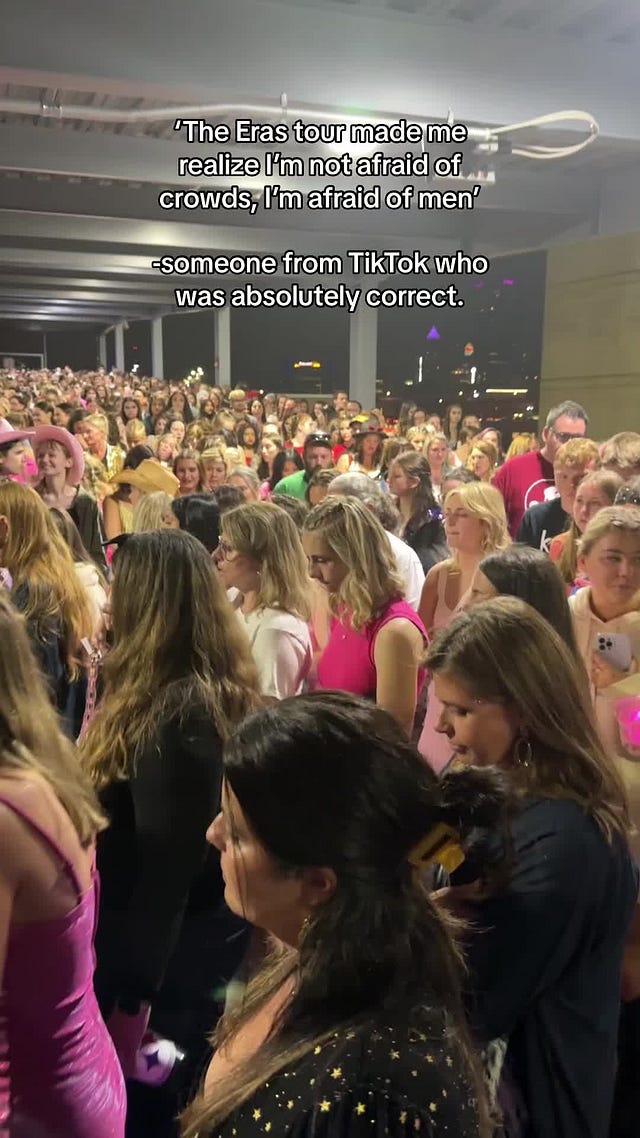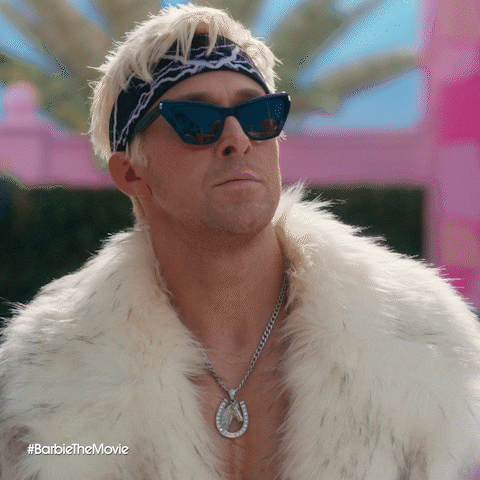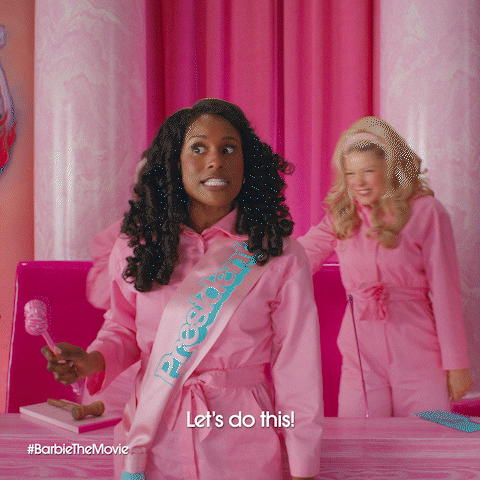What if women created the culture?
Comparing the feminist utopias in Barbieland and Herland.
Warning: this post contains spoilers for the Barbie movie and the novel Herland.
When I saw the Barbie movie for the second time, this time with my husband, I realized just how often I have watched distinctly “boy” movies, and just how few times I’ve watched distinctly “girl” movies.
I think that’s what I loved most about the feminist utopia portrayed in the Barbie movie. Not that Barbieland has a female President or a female supreme court or a female panel of Nobel Laureates, but that it has good music playing on the radio (“Closer to Fine” by the Indigo Girls), that it has choreographed dance parties, that any moment can become a musical, that “it’s girls night every night forever and ever.”
That the default culture is “girl.”
When Ken goes to the real world and learns about the patriarchy, he brings that back to Barbieland and turns it into “Kendom.” Suddenly the radio is playing “boy” music (“Push” by Matchbox 20), all the men are playing sports and drinking beer, they’ve filled Barbie’s dream house with flatscreen TVs and minifridges, they are driving hummers and watching The Godfather. It might be a hyper-fictionalized masculinity on display in Kendom but it’s much more familiar to modern life than Barbieland’s hyper-fictionalized femininity—its exaggeration isn’t quite as dramatic.
That’s because our default culture is “boy.” I used to give tours of the Coors Brewery when I was in college, and back then the beer company featured bikini-clad blonde twins in every commercial. I remember the advertising department explaining to us that if the commercials appealed to men, they would appeal to women too. But if they ran a commercial targeted at women, men would think the product was too girly and wouldn’t buy it. The implication is that “boyness” is something everyone likes, whereas “girlness” is distinctly feminine—only girls would like it.
In real life, the Barbie movie inspired droves of women and men to turn up to the theater in pink and glitter. And this as Taylor Swift’s Eras tour has swept the zeitgeist, ushering a wave of “girlness” across the country. As Swifties descend upon each concert city, they suddenly become feminist utopias filled with women and men breaking out in song on airplanes and taking over public transportation and restaurants. One TikTok went viral for suggesting “the Eras tour made me realize I’m not afraid of crowds, I’m afraid of men.”

 Tiktok failed to load.
Tiktok failed to load.Enable 3rd party cookies or use another browser
Commenters piled onto that post to agree. Many said the Eras tour was the first time they felt safe in a city. They bonded over riding the metro at midnight without fear. They pointed out how nice everyone was everywhere, how organized and respectful. They discussed the complete absence of road rage even as they sat on gridlocked streets and the lack of line cutting as they swapped friendship bracelets with strangers in eight-hour lines for merchandise. One commenter pointed out that “The only negative interaction I had all night was with the guy at the ticket scanner,” another agreed, saying her section banded together to kick an unruly drunk guy out of someone else’s seat.
“If only we could be like this all the time,” one commenter lamented.
What would it be like if life was like that all the time? After I watched the Barbie movie, and then watched it again, I promptly downloaded the utopian novel Herland and devoured the whole thing in a day. Charlotte Perkins Gilman’s 1915 vision for an ideal society is one without men. Isolated after their men die at war, the women of Herland evolve and no longer need men to reproduce—it’s a society of women. Their country is filled with castles and estates wrapped around beautiful gardens—all of the buildings pink. (I loved it.)
When three men “discover” Herland, they are surprised to find such a prosperous civilization. “As I learned more and more to appreciate what these women had accomplished, the less proud I was of what we, with all our manhood, had done,” the main character comes to understand. “You see, they had no wars. They had had no kings, and no priests, and no aristocracies. They were sisters, and as they grew, they grew together—not by competition, but by united action.”
And their society is safe! From men! “It was two thousand years since they had had anything to be afraid of, and certainly more than one thousand since they had outgrown the feeling.”
It isn’t until the introduction of these three men that Herland comes under threat. The men talk about establishing a trade route with the rest of the world, they see economic opportunity to be gained by exploiting that country’s prosperity and personal glory to be achieved from their discovery. One of them even becomes violent in pursuit of a woman.
Which begs the question: Is it men who introduce ego into the world? That seems to be Gilman’s logic. She was not only a respected feminist, but a nationalist—she lectured throughout the United States on the merits of Edward Bellamy’s socialism—and thought capitalism an outcropping of men’s ego.
“No man or woman would work without incentive. Competition is the motor power, you see,” one of the male characters tries to explain to the women of Herland.
“It is not with us, so it is hard for us to understand,” the women reply. “Do you mean, for instance, that with you no mother would work for her children without the stimulus of competition?”
“No he admitted that he did not mean that. Mothers, he supposed, would, of course, work for their children in the home; but the world’s work was different—that had to be done by men, and required the competitive element.”
Why is the “world’s work” different? Why would a mother work for the good of her children, but the father work only for the good of himself? And why does he require competition among his peers to achieve that good?
The “competitive element” doesn’t exist in Herland. Nor does it exist in Barbieland. When the women are in charge they aren’t jockeying with one another for status and position, they simply work together for the benefit of the community.
When the land becomes scarce in Herland, the men are shocked that the women didn’t start hoarding resources from one another. “Neither did they start off on predatory excursions to get more land from somebody else, or to get more food from somebody else, to maintain their struggling mass. Not at all. They sat down in a council together and thought it out.”
“The children in this country are the one center and focus of all our thoughts,” one woman explained. “Every step of our advance is always considered in its effect on them.”
I will admit that a society without ego felt impossible to me in my studies of earlier utopias. Both William Morris’ and Edward Bellamy’s utopian novels imagine a world where we somehow overcome our desire for personal glory and care only for the greater good of humanity—that felt like a pipedream to me. Bellamy was Gilman’s mentor, and he was still convinced enough of our egos that even when he writes out capitalism, he still creates a way for men to compete with one another without it—for ribbons instead of money. Gilman, however, thought removing the men made the idea much more likely.
One of the men who discovers Herland is Terry, who represents the very worst of the male ego. When they discover a forest that has been replanted so that every tree is fruit-bearing, Terry sees only a forest to be cut down for hardwood. When they discover that the women work as spinners and weavers, farmers and gardeners, carpenters and masons, he grumbles that there’s no ambition, no wealth and poverty opposition, no warring of nations. Without men, he says there’s no drama, no fun, no real sport, no competition—he complains about the absence of vices. He thinks he’ll have his pick of the women and boasts that “I’ll get myself elected king in no time.”
We can see a similar longing in Ken. When Barbie and Ken rollerblade their way into the real world, they are suddenly confronted with a montage of bro culture. Men pumping iron, a corporate executive who says “not now Margaret” to his secretary, Rocky. Barbie is reduced to a sexual object in their eyes even as Ken is empowered. She notes that she suddenly has “fear with no specific object,” while he says, “I feel what can only be described as admired.” At some point Ken even develops an affinity for horses, realizing that they are “man extenders.”
The horse was a man extender in Gilman’s time. In her masterpiece work, Women and Economics, she said, “The labor of women in the house, certainly, enables men to produce more wealth than they otherwise could; and in this way women are economic factors in society. But so are horses. The labor of horses enables men to produce more wealth than they otherwise could. The horse is an economic factor in society. But the horse is not economically independent, nor is the woman.”
Gilman’s solution was economically independent women who did not need men for their prosperity. Just as Barbie does not need Ken—he’s only there to “beach.” His entire being is “superfluous,” she says. When we strip away the business suits and the sports cars and the chin-up bars, we strip away every status symbol that means something to Ken but we lose nothing that matters to Barbie. When we eradicate the bro culture, we eradicate the ego, and we’re left with girl culture! In Herland and Barbieland, and around the world, women don’t want to take over the world, they want to better it! The utopias they create reflect, not a restless jockeying for personal greatness, but an ego-less one where competition is not the driver, it’s not even necessary.
If both feminist utopias are bullish on women, an ally can be found in Barbieland’s Allen, Ken’s friend “who can fit all of Ken’s clothes,” and in Herland’s Van, our faithful narrator whose motives were never so ego-driven. Here we see a sort of “positive masculinity” to counterbalance the more “toxic masculinity” of their peers. It is not masculinity itself that is the problem, both utopias seem to say, just the worst manifestation of it. And that is perhaps why Allen has become the unsung hero of the Barbie movie. He wants what’s best for both Barbie and Ken, even if he can see how Barbieland might achieve that better than Kendom. His is a blueprint for a masculinity defined by rationality, not ego, and his only desire is to see everyone work together and be happy.
Since Gilman’s time, women have achieved economic independence (at least more of it than horses, in most places) but we are still finding ways to carve our “girlness” into it. That was the point of Legally Blonde more than 20 years ago, and of Barbie and Taylor Swift’s Eras tour today. It was never about the fact that women can do everything, but that women can do everything differently. That our “girlness” should be celebrated not subdued.
“I have no difficulty holding both logic and feeling at the same time,” Lawyer Barbie says, “and it does not diminish my powers, it expands them.”
And maybe that’s why we have created pockets of girldom where we can still celebrate the feminist utopia. Where we can wear pink and share friendship bracelets, and find a sense of unity with one another no matter our gender or profession or economic status. Because we can dress up for Barbie or attend a Taylor Swift concert and feel like our “girlness” is part of the culture, just for a moment. And hopefully we can bring some of it into the default culture while we’re at it.
I hope you loved Barbieland (and Herland) as much as I did!
Thank you so much for reading,
Marginalia
Herland is now my favorite of all of the utopian novels I’ve read. Not only does it express an incredibly beautiful society, but it has a fun plot and incredible character development and emotional growth as the three men learn to adapt and even accept a new (and sometimes better) culture than their own.
Here are some of my notes on the society they have created:








